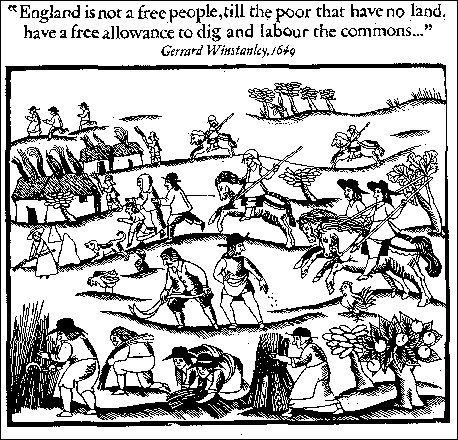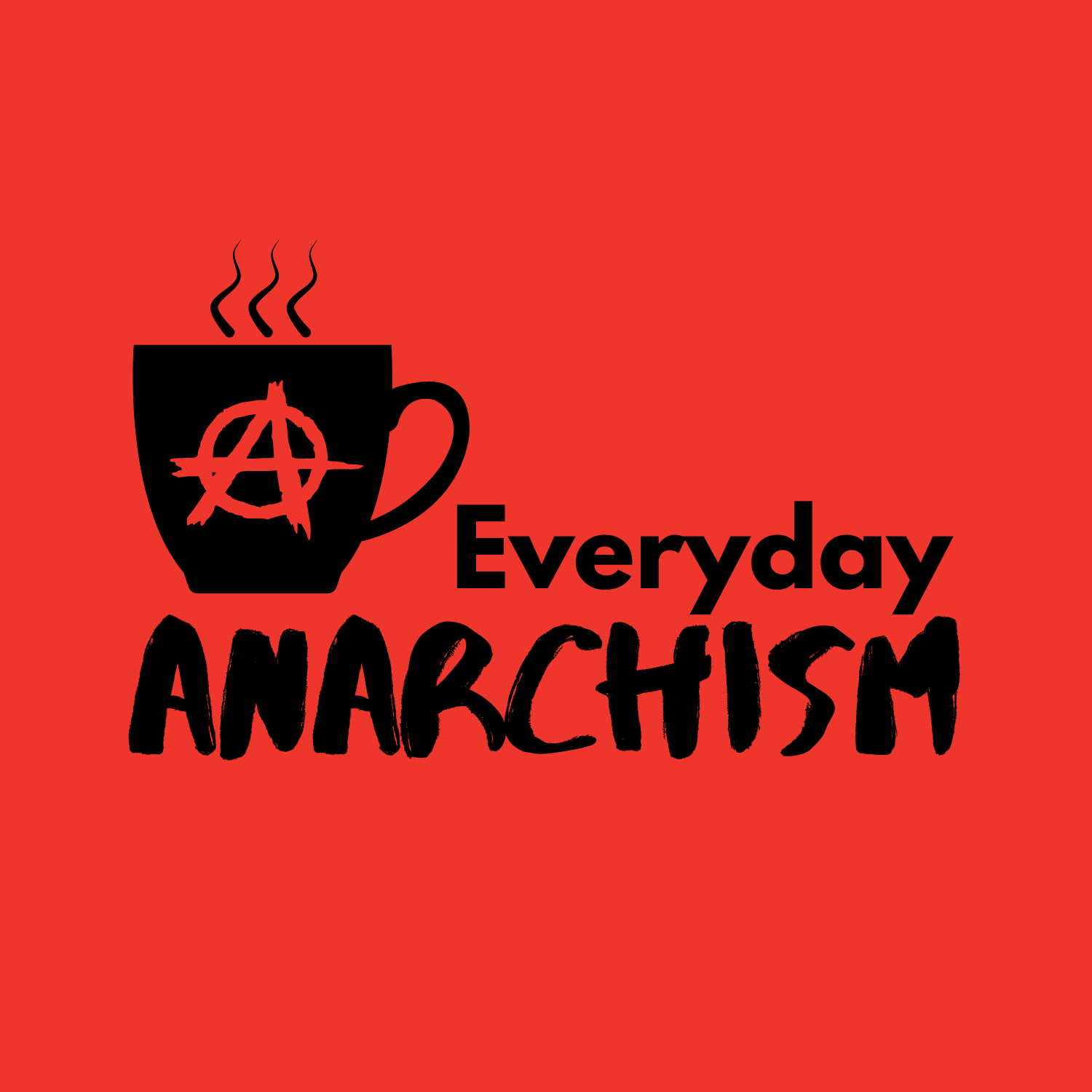Anarchism in the English Revolution

For my first newsletter in probably about a year, I wanted to introduce a podcast series I'll be running this fall, Radicalism in the English Revolution. And having done that - I'll be running a podcast series this fall about the various radical ideologies that emerged in the English Revolution - the point of this newsletter is to address the title. And the question: why isn't it called "Anarchism in the English Revolution?" In this newsletter, which will probably have a sequel or two, I want to try to answer that question.
The short answer is that I didn't think I could get away with it. This series will be entirely comprised of interviews with historians, and I thought that they might object to the claim that there was anarchism in the English Revolution - after all, no one used the word anarchist as a self-description until Proudhon in the middle of the 19th century. So radicalism was the safe choice.
But also, I think, the wrong one.
I'd like to spend some time now explaining why I think that there was anarchism - indeed, anarchists! - in the English Revolution. And I think it matters that we say that there were anarchists in the English Revolution, for reasons that have to do with my larger views on the history of ideas, the meaning of words, and how we can and should talk about the past (and the future).
This essay will cover my first, and least controversial, defense of the idea of anarchism in the English revolution, which has to do with the nature of the revolution and modernity. In his famous essay "Anarchism" for the Encyclopedia Britannica, Kropotkin argues that the idea of anarchy can be found throughout the ancient world, including in the works of Zeno and Lao Tzu. But anarchism, according to Kropotkin, in its modern condition begins with William Godwin in the late 18th century, because Godwin was the first to articulate "the political and economical conceptions of anarchism." This was in the 1793 edition of Godwin's book Enquiry Concerning Political Justice, and the year is significant: 1793 is the height of the French revolution and thus one of the markers of the political and economic conditions of modernity.
As Ruth Kinna put it when we discussed Kropotkin's Britannica essay, the argument goes that the loose set of ideas or impulses which could be called ancient anarchy, or proto-anarchism, is crystallized into what we can formally call anarchism once the political and economic conditions are met. Anarchism, in Kropotkin’s formulation, is anarchy+modernity. And modernity in this sense is the dual revolutions described by Eric Hobsbawm in The Age of Revolution: Europe 1789-1848: the industrial revolution in England and the French Revolution, both of which spread throughout Europe and eventually the world.
If we accept the formulation anarchism=anarchy+modernity (and I don't; that will be in a future newsletter), then the stakes for finding anarchy in the English Revolution aren’t very high. Anarchy, in Kropotkin's sense of "opposition to the governing hierarchic conception and tendency," exists everywhere and at all times in humanity. But it is only anarchism if it's opposed to specifically modern hierarchic conceptions, which are centralized state power and economic capitalism. So finding anarchy is easy; the stakes lie in the question: was the English Revolution a modern revolution, about the same things and in response to the same forces, as the French Revolution?
For my entire professional life, the period which was called "Renaissance" when I was in high school has been called "the early modern era." The first great kings of Europe, or at least the greatest ones since the death of Charlemagne in 814, emerge in this early modern era, especially Henry VIII in England, Francois I in France, and Maximillian I in the Holy Roman Empire. Of course, none of these men centralized their government to the extent that Louis XIV did in France a century later, but the political process of modern centralized state power had begun, helped along substantially in England by Henry VIII's appropriation of church land (dare I say nationalization of the religious industry?). The treaty of Westphalia in 1648 (at the same time as the English revolution!) set the stage for the modern state as a bounded geographical region in which a sovereign controls violence; a characteristically medieval alternative arrangement, the Hanseatic league, petered out during the 16th century and more or less ceased operations in the mid 17th century, just a few decades after the English revolution.
Economically, the 16th and 17th century also saw the rise of industrial capitalism. In England specifically, enclosure of common land in Tudor England was an early version of the industrial revolution: economic power became centralized, peasants were urbanized and proletarianized, and a bourgeoisie arose. But much more important were the developments in the Americas. There's nothing more characteristic to the industrial revolution than factories. And in contrast to the traditional understanding of the rise of the factory in 18th century England, many historians now argue that plantation farming was a form of factory capitalism - the first factory farms. Not only were the plantations organized as factories, with a strict central hierarchy using violence to manage a workforce made up of slaves or wage slaves, but also plantations (especially sugar plantations) depended on extensive machinery for processing - a mechanical factory at the center of an agricultural factory. The sailing ships - both merchant and military - which transported enslaved Africans, raw materials, and finished goods can also be described as factories, with similar hierarchies, efficiences, oppressions, and tactics of control.
Perhaps I'll find the time to address the role of religion in modernity in another newsletter; I think both Hobsbawm and Kropotkin don't take it into account enough. But even without religion, I think I've made my case as well as a nonspecialist can in a few paragraphs. The French Revolution was a response to a new world, in which centralized state power confronted a new form of economic organization which had undermined the aristocracy and empowered a new merchant class while transforming the peasant class into the proletariat. In every way, England of the 1640s was less developed along these lines than France in the 1780s, but the new political economy was developed, even thriving, by the 1640s. So when the king squabbles with the aristocrats about funding his government; a civil war breaks out; the king loses, flees, and is executed; a new central executive figure takes power and tries to set up a new regime; and the new regime falls in favor of a restoration of the old regime, we know what to call it: the first great political revolution of modernity, and it didn’t start in 1789. By the same token, when someone like Gerrard Winstanley attacks this ecclesiastical, political, and economic order using the terms and tools of anarchy, he is setting anarchy against modernity. And we've got a word for that.
As you’ll hear if you listen to the episodes I recorded with Ariel Hessayon, I addressed these two questions directly, and Ariel and I agreed, provisionally, that the English revolution was a modern revolution and that Winstanley’s ideas accord with those of Kropotkin or Tolstoi (roughly). That doesn’t mean that Ariel said that Winstanley was an anarchist, but it does mean that I’m willing to say that. If we really mean it when we call the 15th, 16th, and 17th centuries “the early modern period,” then the anti-hierarchy, anti-state activists of that period are anarchists.
With all that said, as I mentioned earlier, I don't think we need to wait for modernity before we can call someone an anarchist. If I'm following the thread of what gets called "anarchism" in the 19th century, I'm happy to call that thread "anarchism" wherever I find its genealogy. Words are never anachronisms, or are always anachronisms - take your pick, but either way, since I think anarchism is just a new name for some old ideas, I have no hesitation using that word to describe Zeno or Jesus. If I can find the time, I'll explain that reasoning in another essay in this series.
